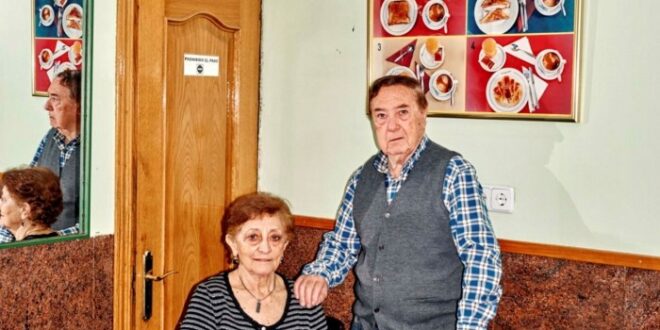This article is a part of FT Globetrotter Guide to Madrid
Rocablanca is a refreshingly unpretentious place on Calle de Fuencarral in Madrid’s trendy Malasaña neighbourhood. This no-frills neighbourhood bar has been a local favourite since the 1970s. It is a refreshing change from the chichi boutiques that try to lure big spenders in with their carefully curated interiors. The menu is written on wooden boards with bold, slightly wonky letters. It lists sandwiches, beers, hamburgers and coffees alongside the star dish: a chunky, reimagined version of the deep-fried Spanish classic the. Crochet The (croquette), which has won legions of admirers across Madrid.
Rocablanca attracts both locals and tourists. It is a vibrant environment that is full of activity. The clattering of plates bounces on the gleaming surfaces and mirrors, while napkins that fall to the ground are swiftly swept away. The ambience has changed little since Rocablanca was first opened two doors down in 1974 by newly-weds Fermín del Cerro and Cecilia Martínez. Back then, Rocablanca was part of an area of small shops that lined the sleepy street.


I rented out a space which was formerly a milk bar. I began with churros and breakfasts,” says Fermín. The atmosphere in the neighbourhood was completely different, it was like another world. Everyone knew each other [and] The shops were like institutions, and everyone would greet you on the streets. It’s different today.”
The couple was there when I visited on a recent day. They had retired recently after celebrating their golden wedding anniversary. Carlos delcerro, their son, now runs the business. But they still stop by daily.
Delighted to share the history of his bar with me, Fermín takes me out into the street to point out where some of the old businesses were located on Calle de Fuencarral: long-vanished establishments such as the San Mateo hardware shop (established in 1925) whose catchphrase “Si no lo veo no lo creo” (seeing and believing) He remembers very well a restaurant which used to serve game but is now an upmarket hamburger place. He even drags me into a shop selling novelty socks a few doors down, where he proceeds to sweet talk the young assistant into letting us see the storage space out back — the first premises he rented for the bar back in 1974.

“But little by little, things started going downhill,” Fermín says of the economic crisis that roiled Spain in the 1980s. The newfound freedoms that followed Franco’s dictatorship resulted in a flourishing of the arts, but jobs were scarce and businesses struggled. We had some difficult years back then. Cecilia says that many businesses have closed.
“Of Course, It Was the Movida Madrileña,” says Carlos referring to the period following the transition to democracy when Pedro Almodóvar and other emerging film-makers, artists and musicians gathered in Malasaña, earning the area a wild and exciting reputation. This artistic revival had a darker side. Heroin was now widely available, and crimes increased. Addicts looking to score would gather in nearby Plaza de Chueca, — a phenomenon captured in Pedro Almodóvar’s 1989 Tie Me Up! Tie Me Down! The film shows Antonio Banderas as Ricky, who is beaten by a dealer and robbed. The Rocablanca bar owners claim that they were not assaulted, but the bar has been robbed several times at night.
“There were about 15 drug addicts we knew of — they were around 20 to 25 years old,” recalls Fermín. “All those children died.”
Early 2000s saw a change in favor of the LGBTQ+ Community, as government subsidies were used to renovate the local buildings. Carlos explains that “the gays came and changed everything,” transforming the entire neighbourhood. The way Calle Fuencarral looks today is partly due to this change.
The streets began to change from the Plaza de Chueca up, as restaurants and shops opened. There was also a mayor who helped with subsidies for the buildings,” says Fermín, referring to Alberto Ruiz-Gallardón, mayor of Madrid from 2003 to 2011, who oversaw the renovation of many of the area’s late-19th-century buildings that had fallen into disrepair.


Carlos joined Rocablanca to assist in the expansion of the business. By the early 2000s, Rocablanca had opened three stores on the street. Carlos was just 26 when he came up with some great ideas for improving the business. Rocablanca was closed at 8pm. He extended his opening hours until around midnight.
“When I arrived, we began to offer more food at night for younger clients: hamburgers and salads. Crochetas [with] Carlos says, “I’d like to have an aperitif.” “My father asked me to make the glasses smaller. But I still believed in the idea of a large Crochet“, displayed in a display cabinet.”
Rocablanca is a large and unusually large CrochetasIf you want to know more about a specific topic, please click on the link. croquetón, They are a Madrid institution and have become a symbol of the city. Just €1.80 each, they come in six varieties that straddle the gap between innovation and tradition. The classics are also available. jamón The parmesan-and-aubergine version injects an Italian touch into this traditional Spanish dish.


Carlos said that he spent half of the night perfecting his recipe.
Any great Crochet, this chunky snack is coated in a crispy breadcrumb batter that yields to a wonderfully soft béchamel filling which can contain tender pig’s cheek (CarrilleraYou can also try prawns with garlic or a classic Madrilenian dish. cocidoThe chickpea soup.
Carlos is rarely seen to accept the compliments of his customers, despite their rave reviews. The counter staff are the ones who provide the personal touch, as they are a friendly bunch that is treated like family. Loyalty to the business is strong among them, and one member of staff recently retired after 47 years of service — just before Carlos’s parents.

The staff are a major reason for the success of the business. The closure of the other Rocablanca branches was forced by the increasing gentrification in the area. Carlos says that for several years, Calle Fuencarral had high rents and they were seriously considering closing. “But, we’re like a small family. We have people working for us who are long-term employees.”
Luckily, the family had bought the current premises and were able to consolidate their position, closing the two rented venues — a wise move in hindsight, as Madrid rents are now soaring.
At the bar, Celia and Fermín are in their element, greeting the elderly clientele who sit at the zinc countertop enjoying their morning coffee and churros.
This isn’t an automated chain. Here you can come and say, ‘I want my sandwich this way, my toast that way,'” says Carlos. “People value that — to have someone in front of you who isn’t inputting your order into a machine. People talk about the football game the night before, politics, everything.
Later, as the bar is filled with hip young people who are clamouring for drinks, the atmosphere will become equally vibrant. caña — a beer poured with the huge foamy top traditional in Madrid bars — and, of course, Carlos’s blockbuster Crochetas.
Rocablanca, Calle de Fuencarral 71, 28004 Madrid. Opening times: Monday–Wednesday, 7.30am–11pm; Thursday, 7.30am–11.30pm; Friday, 7.30am–12.30am; Saturday, 8.30am–12.30am. Website; Directions
This article is a part of a series about local gems – the modest neighbourhood restaurants which combine good food and affordability with a community feel. Do you have a favorite local gem? Let us know in the comments
Follow FT Globetrotter Instagram at @FTGlobetrotter
Cities with the FT

FT Globetrotter, our insider guides to some of the world’s greatest cities, offers expert advice on eating and drinking, exercise, art and culture — and much more
Find us in Madrid, Copenhagen, London, Hong Kong, Tokyo, New York, Paris, Rome, Frankfurt, Singapore, Miami, Toronto, Melbourne, Zürich, Milan, Vancouver, Edinburgh and Venice
 Costa News Spain Breaking News | English News in Spain.
Costa News Spain Breaking News | English News in Spain.







